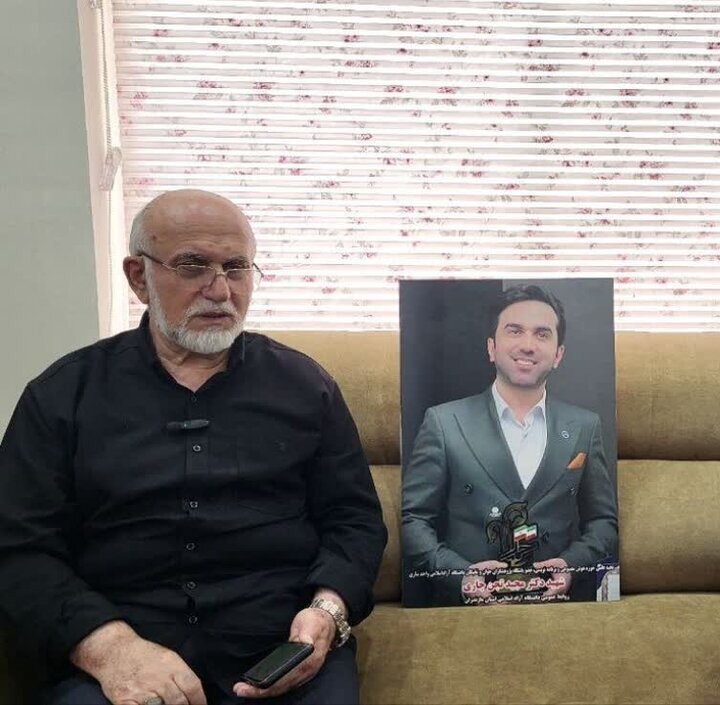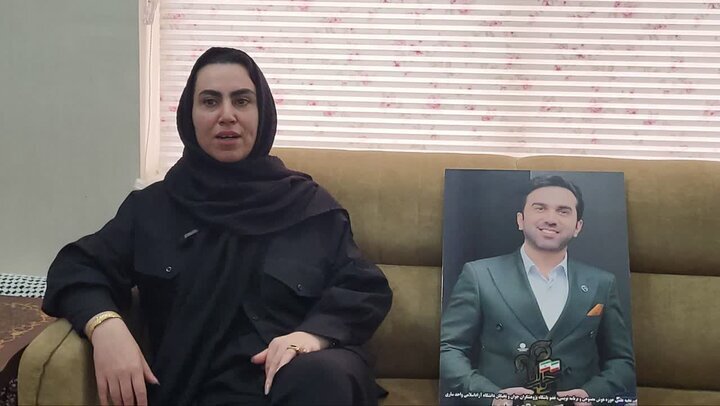TEHRAN- Martyr Majid Tajan Jar—a scientific genius who journeyed from the courtyard of his home in the village of Tajan Jar in Mazandaran Province to the heart of the world’s AI, now immortalized beside the word martyr.
Dr. Majid Tajan-Jari was a child who didn’t just take apart a broken radio but pieced its scattered fragments together like a puzzle, crafting a future with his small hands—a future that still echoes in the quiet of his childhood home.
It was as if an inner voice whispered to him: “The future begins right here.” This is the story told by a mother who witnessed every moment of it… and now narrates the silence of a home that her son, with his brilliance and his blood, gave meaning to.
A brilliance that seemed to have come from the future…
Some people are born not just for their own time, but for the times to come. From childhood, Dr. Majid Tajan-Jari showed signs of this timelessness in his demeanor—a sharp, creative mind that quickly blurred the line between play and science.
zobeideh Khaleghi, the martyr’s mother, recalls: “I remember one day when we went to the store together. Video players had just arrived. Majid was about ten or eleven. He took an old radio from his aunt, dismantled it, understood its components, and rebuilt it from scratch. We just watched, but it was as if he had a blueprint in his mind.”
Their simple courtyard became his laboratory—where he worked with electrical circuits and soldering. “One day, he asked me, ‘Mom, I don’t have a workshop—can I work here?’ I told him, ‘This house is yours. Do whatever you want.’”
Majid’s father, a retired employee, spoke of their financial struggles: “We had little, but Majid never gave up. He taught himself, built, and created.” At eighteen, he built a robot that didn’t just move—it thought.
Zobeideh continues: “We didn’t understand what he was making, but we knew it was something from the future.” Her voice is quiet, choked with emotion: “The pain of losing a child who was building the future is unbearable. The house feels smaller without him, and its silence is louder than ever.”
Yet Majid was not only unmatched in scientific brilliance—his ethics transcended ordinary boundaries. “He was kind to everyone; his respect and politeness were legendary,” his mother says. “Sometimes I thought his ‘grade’ in ethics was infinite.”
Majid’s move to Tehran was quiet and unassuming. “For fourteen years, he worked in silence,” his mother recalls. “I didn’t fully grasp what he was doing, but I felt he was fighting for something greater than himself.”
The scent of his shirt still lingers in the house…
Her voice trembles—not from breaking, but from standing firm, from honoring that pain. Softly, she says: “When I saw his body, it was as if the world stopped. I just looked at him… with that same smile he always had in my memory. I told myself, ‘Be calm—he wasn’t meant to stay. They didn’t bury him in the earth; they took him to the sky.’”
“He always said, ‘Kiss my throat, Mom…’” A brief silence follows. The mother looks down, then speaks a heavy truth: “Every time I visited his home, he’d say, ‘Mom, kiss my throat…’ Now I understand. I’m ashamed that the last time, I couldn’t kiss his throat.”
Our hearts are broken, but we have not collapsed
Amid this crushing grief, a voice rises from the depths of faith—not of mourning, but of resilience: “My sister calls every day and asks, ‘Zobeideh, I’m just his aunt, and I’m burning with grief—how are you still breathing?’ And I tell her, ‘Patience is the only thing Majid planted in my heart. He left, but he left his patience behind for me.’”
“His memory has lit up our lives.”

“We mothers live with our skin and bones—we touch pain. But every night, I tell myself, ‘Majid, my soul, though they took your body from me, your name, your memory, your voice are still with me. Sometimes, I still hear the door… as if you’re coming home, turning the key, saying, ‘Mom, I hope you’re not tired.’”
Ali Tajan-Jari, the martyr’s father, a quiet man with a gaze heavy with years of experience, sits on the couch, flipping through old photographs.
In a simple home, he had a global mind
His father, with a faint smile, glances toward the courtyard. A quiet pride lingers in his eyes: “That simple home, that humble courtyard, became the birthplace of boundless dreams.”
“From that small room, he connected with the world. He said, ‘I will stay in Iran, but my scientific voice must be heard beyond borders.’ And so it was. I often heard that when asked where his students were, he’d smile and say, ‘Everywhere… Spain, England, Canada, Turkey…’”
He built bridges from failure
A brief silence lingers between the father’s words before he continues: “In one of our talks, he said, ‘I’ve failed many, many times… but I built a home—a scientific family. All my chances were there.’ That group was called ‘AIO Learn’—young people who rose from the ground and reached the summit.”
The father places a hand on his chest, as if something deep within him speaks: “We didn’t know Majid was teaching. Not out of secrecy, but because, amid building robots and AI projects, that side of him was less visible.”
“One day, we heard his students had surpassed 500,000. Majid was a teacher without borders—with a virtual blackboard, yet magnificent. And all of it began in a room that didn’t even have an extra chair. Just love, a laptop, and a light of passion.”
“He always said, ‘Science must have attraction—not fear, not force… only motivation and the desire to know.’”
A Quran that still carries his presence…
Moments later, the father grows quieter. His eyes settle on a small Quran on the table—the one that had accompanied his son for years. Slowly, he takes out his glasses, places them on, and silently recites a verse.
His voice is soft, but the words are clear and firm. He closes the Quran, running his hand over its cover—as if still feeling the warmth of his son’s hands.
In the silence of the house, only the sound of his breathing can be heard. His gaze lingers on his son’s portrait. He says nothing. But that look tells a thousand unspoken words.
The end of a story, the beginning of a path
This chapter of Majid’s life was not just a career—it was part of Iran’s scientific identity today. A young man who chose to stay instead of emigrate, to build instead of complain, and to take root instead of leave.
In a simple home, with hands on a keyboard and a heart full of conviction, he trained students who now carry his legacy across the world.
The legacy he planted in life…
Mohaddeseh Tajan-Jari, the martyr’s sister, sits composed in the frame of the image. Soft light from a half-open window falls on her face. Her voice, delicate and measured, wavers between sorrow and pride:
“Sometimes they ask, ‘What did Majid leave behind?’ He had no children, no family of his own… But I say, ‘If only they knew what a child truly is.’”
“Majid did not father a child of his blood, but he fathered one of his mind—he named it his company. He always said with certainty, ‘I built AIO Learn… this is my child.’”

She pauses briefly, then adds: “Majid wasn’t just my brother—he was my confidant. We never fought—not because we couldn’t, but because there was no need. We were friends, united in thought, concern, and heart. More than a brother, he was my teacher—one whose silence itself was a lesson.”
“When my child was born, he was genuinely happy. He’d buy toys and say, ‘He must grow up intelligent.’ He wasn’t a father, but he lived fatherhood. In action, he was a martyr—not just in title.”
Her voice grows quieter, but the meaning grows heavier: “He didn’t see martyrdom only in combat. He stayed up till dawn coding, creating ideas, building the future. He wrote projects that seemed to come from decades ahead.”
“His jihad was a jihad of thought—his battlefield was science, his weapon genius. Martyrdom was not the end of his path—it was the manifestation of a life entirely devoted.”
My brother said ‘no’ to money, ‘yes’ to his homeland
The narrative shifts—from emotion to loyalty, from offers to faith. “When a major European company made him a staggering offer, everyone thought his choice was obvious. High salary, easy immigration… I told him, ‘Majid, it’s your decision.’ He smiled and said, ‘Mahdeh, I can’t live in a country where they lie about my people day and night. Even if I have to live in a tent, I’d rather be in my homeland.’”
An ascension that was preordained
Her gaze drifts to a distant point—a moment of silence. Then, with inner conviction, she says: “Majid wasn’t born—it was as if he descended. He came to build, to teach, to inspire… and when his mission was complete, he left. Not in silence, but at his peak.”
“I always think God entrusted Majid to us for only thirty-five years. Now, his mission is over… but his voice still flows.”
We are still standing…
Today, the small room in the Tajan-Jar home is silent. The sound of soldering is gone, the monitor remains dark, the desk empty. But the ideas born in that room are more alive than ever—in the pulse of research, the veins of science, the sky of hope.
Martyr Dr. Majid Tajan-Jari is no longer among us, but his vision still shines in the eyes of his students. His thoughts live on in the code he wrote, the projects he brought to life, the dreams he refused to leave unfinished.

He is gone, but his path remains. His principles—his belief in staying, in building, in nurturing elites on his homeland’s soil—endure.
A father, with eyes full of pride, spoke of a son who, in silence, in dignity, in action, wrote a new definition of scientific jihad.
And today, we are certain: some people do not come to stay—they come to light a lamp that will illuminate the path for years to come…
Martyr Dr. Majid Tajan-Jari was not just a scientific genius—he was the embodiment of committed, scholarly, and national life. A man who could have crossed borders, shone in the world’s best institutions, but chose to remain in this soil, take root, and build a bright future.
(Source: Mehr News Agency)
![Lee Dong-heon, CEO of A-Slip. [Maekyung DB]](https://wimg.mk.co.kr/news/cms/202507/21/news-p.v1.20250603.a17d05c190aa481cb4adfc42d8985e5d_P1.jpg)
![Jang Seung-woong, CEO of TenMines. [Photo provided = Ten Minds]](https://travelstoriz.com/wp-content/uploads/2025/07/news-p.v1.20250603.b5d0307b1df04c68a0623a6a622918ad_P1.jpg)






































You must be logged in to post a comment Login